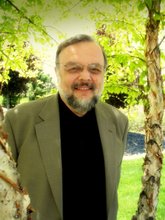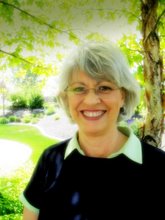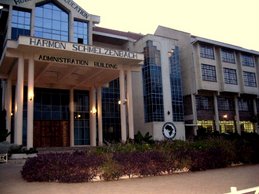
As our readers know, we've been
asked to write a "missionary book" for NMI. It has been a deep personal privilege to sit around our dinner table or on our back balcony overlooking the Athi Savannah talking to committed, faithful people about their lives and beliefs. We'll be previewing some of the chapters with Africonnection readers before they go to NMI. The convention of what follows is that the narration is in BOLD and the words from the interviewees are in ITALICS.
Fidele Samvura Senga, the third child of a Nazarene District Superintendent, was born in a Nazarene church and school compound in Isenyi, Rwanda about 20

miles east of the border with the Democratic Republic of the Congo. After high school, he attended Africa Nazarene University where he will graduated with a Bachelor of Theology degree in May of 2009. While a student at ANU, he wrote a grant application for his church's affiliated orphanage and is helping to administer the grant and the orphanage as he completes his studies. (The picture of children and of a building are of the orphanage.)

Because of his work as a DS, Fidele’s father spent many weeks each year away from
.JPG)
home visiting churches, encouraging pastors, and seeing to the work of the district. Even so, some of Fidele’s best childhood memories are of his family and of his parents. Although it wasn’t important at the time, his father was a Hutu and his mother a Tutsi. My father used to be away for ministry but every time he could come he could gather us around the sitting room and ask each one of how the week was. My mother could give him a report both negative and positive and if it is punishment we were to get it there and then, and we moved on with life. My father always gave us a chance to challenge him. He could come and sit all of us around the table and tell us to state what we have seen too extreme on his side, so from there we saw him being like our elder brother than being our father. My mother could understand us more easily than our dad because our dad had to practice justice but my mum could exercise mercy.
Although today many Rwandans remember long periods of living with their
neighbors in peace, when the Rwandan president’s plane crashed in April of 1994, it reopened old disagreements between Tutsis and Hutus. In the four months between April and July of 1994, thousands of Tutsis and moderate Hutus were killed. Some estimate the final death toll as high as 800,000. Fidele and his family were caught in the violence. When the Rwandan genocide began, Fidele was up country at St. Andrews, an elite Catholic secondary school. After the president’s plane crashed in April 6th 1994, I had just joined Form One (9th grade), but when we heard that all the Hutus were to be killed we were called back home. The Catholic brothers used the school buses to take us to the doors of our homes. When I arrived at the Nazarene compound, there were between 70 and 100 young men with pangas (machetes) who came into the compound to look among the 300 students in our
.JPG)
Nazarene high school for those who were Tutsis. My father and some church leaders had just returned from morning prayers and were sitting outside. The young men said that they wanted to see all the invenzi, the cockroaches, which was the name they gave the Tutsis. My father joked with them, saying, “We do not keep cockroach here, we have students!” When some of the young men started threatening my father others started shouting, “This is our pastor! Stop threatening him!” So they went but still the tension was in the air and those who were in the compound had to find their way out of the country.
Outside of the relative safety of the Nazarene compound, the Rwandan genocide continued. As Fidele and members of his family left to find food and try to rescue people and later as they fled to the Congo, they saw disturbing and unspeakable sights.You could walk out of the compound and find people killed, to the extent it was like a normal thing to find a person lying down across the road dead. The place they were calling the District Commissioners place was really a cemetery run by people whose work was to kill people. Those who had cash could buy a bullet for quick death rather than being killed more slowly by the pangas. People were told to dig their own graves and then were buried while they were alive. A military commander who came to the cemetery found a Catholic archbishop and two priests being buried alive. When those burying them saw the military commander, some ran away and others were ordered to remove the soil, freeing the priests. We did not prepare to go to the Congo. We woke up at the middle of the night and joined the masses of people walking toward the border. That distance of 20 miles took us the full day to cross over. We walked tied together so that no one of us should get lost. You could hear many children shouting, “Mum!” because they had gotten lost. There were many people using the same path—perhaps as many as two million who went into exile at some point, including sixteen thousand Rwandan Nazarenes who made the trip under my father’s leadership.
The family stayed in the Congo until 1994 when Fidele’s father was invited to pursue a Master of Arts in Religion degree at ANU. Fidele’s father continued with his studies until 1996. Although it was officially two years after the peak of the genocide, there was still a struggle in Rwanda for leadership of government, business, and the churches. My father felt that he needed to go back, because there were some people who wanted to take over most of the institutions in the country. Because there was a leadership problem, the church in Rwanda was in trouble. In 1996, my father went back to Rwanda to help the church. Then, in November of 1997 as he was making plans to come back to ANU, he was killed as part of the disagreements about leadership of institutions in the country. My mother was with him and was beaten and unconscious for awhile, but they did not kill her because she was a woman. Later, we discovered that prior to my father’s death 14 young people from the church had been killed in the same disagreements.
After Fidele’s mother recovered, she returned briefly to Kenya to accompany the family back to Rwanda. Fidel’s mother was determined to redeem the family’s experience of the genocide, loss of their father and lengthy separation from each other and from Rwanda. My mother adopted a new lifestyle because she felt like she needed to bring us up in such a away we could forget the past and put our mind on God. So she is the one who was much encouraging us to be involved in the church and to understand how far we had come. And she felt that the only way should could is to pray and encourage us to do the same, even now she has set apart Tuesday as the day she prays for all of us as her children. For me, forgiveness has been a matter of accepting and not dwelling in the past and seeking a way of living a new life. So this idea of forgiveness, it took time for me and for the family members, we decided to do it as a family and let what happened be of the past and look forward for a better life.
A chance trip to a Rwandan Peace and Reconciliation conference brought Fidele into contact with an American Nazarene family who were so impressed with Fidele that they offered to pay for his University education and suggested he attend Africa Nazarene University. Fidele credits ANU with allowing him to meet Nazarene leaders from all over Africa and to sharpen his thinking and his skills. As we had done with other interviews, we asked Fidele some questions designed to encourage sharing some ideas from his own perspective as a young African Nazarene leader in training. Here are some excerpts:
· On moving from bitterness to forgiveness: When the genocide and the death of my father were happening, I did not have much understand of who God was. I did know that God was good. We expected the God of love to be on our side but it did not seem to be true. Even the people we expected to be on our side did not seem to be. I came a book that talked about understanding God. The author was saying that our mind is so much limited that we see thing happening around, and we do not seem to understand. It makes it clear that God does not change with what happens to our lives, he still remains God. His ways of doing things can change but for him he does not change. In that situation, it gave me hope, I was able to figure out that my mum could have died with my father but there is a reason why she is alive. The encouragement we get from mum has kept me moving. Faith with God and her involvement in ministry has helped God make sense to us. I know God loves me the same way he loves other people and He regards me as a special person.
· About what the African church can contribute to the global church: I think in Africa we have really responded to the call of the church as a community, which is one of the strengths of the African community. If our definition of a church is the coming together as a family to worship God, and we can see it lacking from our Western brothers because they are more event oriented and we are more oriented toward people and relationships which falls under social wholeness. If Africa can pass on to our Western brothers the real value of community it will be a good thing. It will make us feel that we all need each other. And the idea of where one comes from, or of white and black, will not be there because we will feel we are all the same.
· About missionaries:. In our church administration class at ANU, we asked one of our professors whether he thinks the church in Africa needs missionaries, and surprisingly he answered that the church in Africa needs missionaries who are born again. I think that was because he has stayed in Africa for long and he knows the challenges that are facing the church in Africa. I think what he meant is people who are willing to forget their identities and learn new ways of ministry; he meant people who can adopt to the fields that they are send into so that they can be more of a support to the fields that they are send into. Without the presence of missionaries one cannot sense the idea of the church being an international church. The idea is for the national church to be able to sustain itself both spiritual and financially
· On the message of holiness in Africa: What I understand about holiness is the desire to walk with Jesus. There are so many things we get from walking with Him. Like the things we get from the Bible, and the people we walk with, and even our community. The holiness theologians will come with many, many theological words explaining what holiness is instead of using a simple word. We are not talking about holiness because it is a denominational requirement but because it is what God expects us to live by. The best witness of our holiness life should be the people who are living around us. They will be able to say that we are Christians and Nazarenes, they will be able to experience and witness about our holiness life.
· About how people can pray for him: I need God to help in the message that I preach to people to be of relevance to them and I may be able to make it simple to them without necessarily complicating their lives.

.JPG)

.JPG)



























.JPG)
.JPG)



.JPG)
.JPG)
.JPG)
.JPG)
.JPG)
.JPG)
.JPG)
.JPG)
.JPG)



